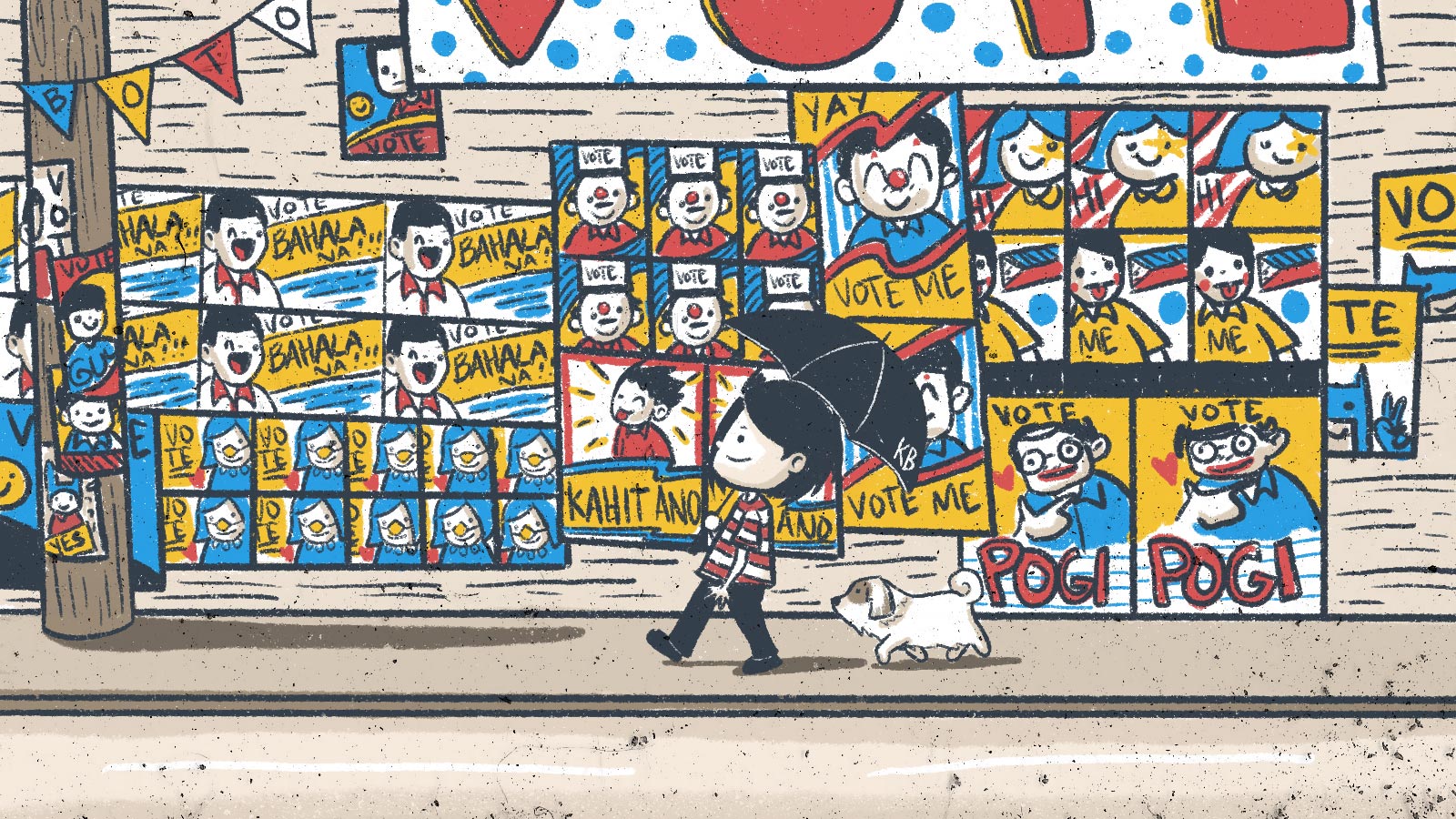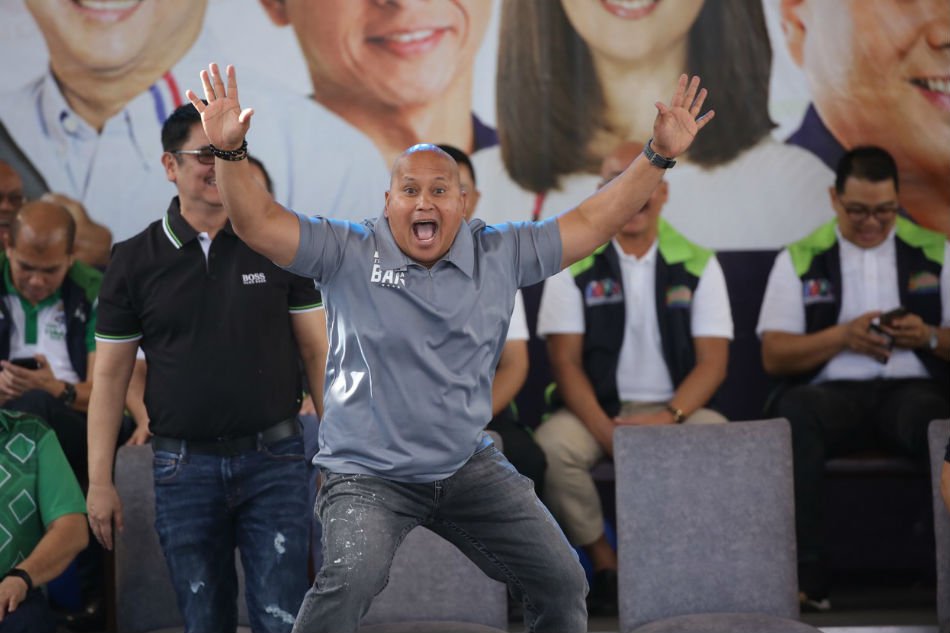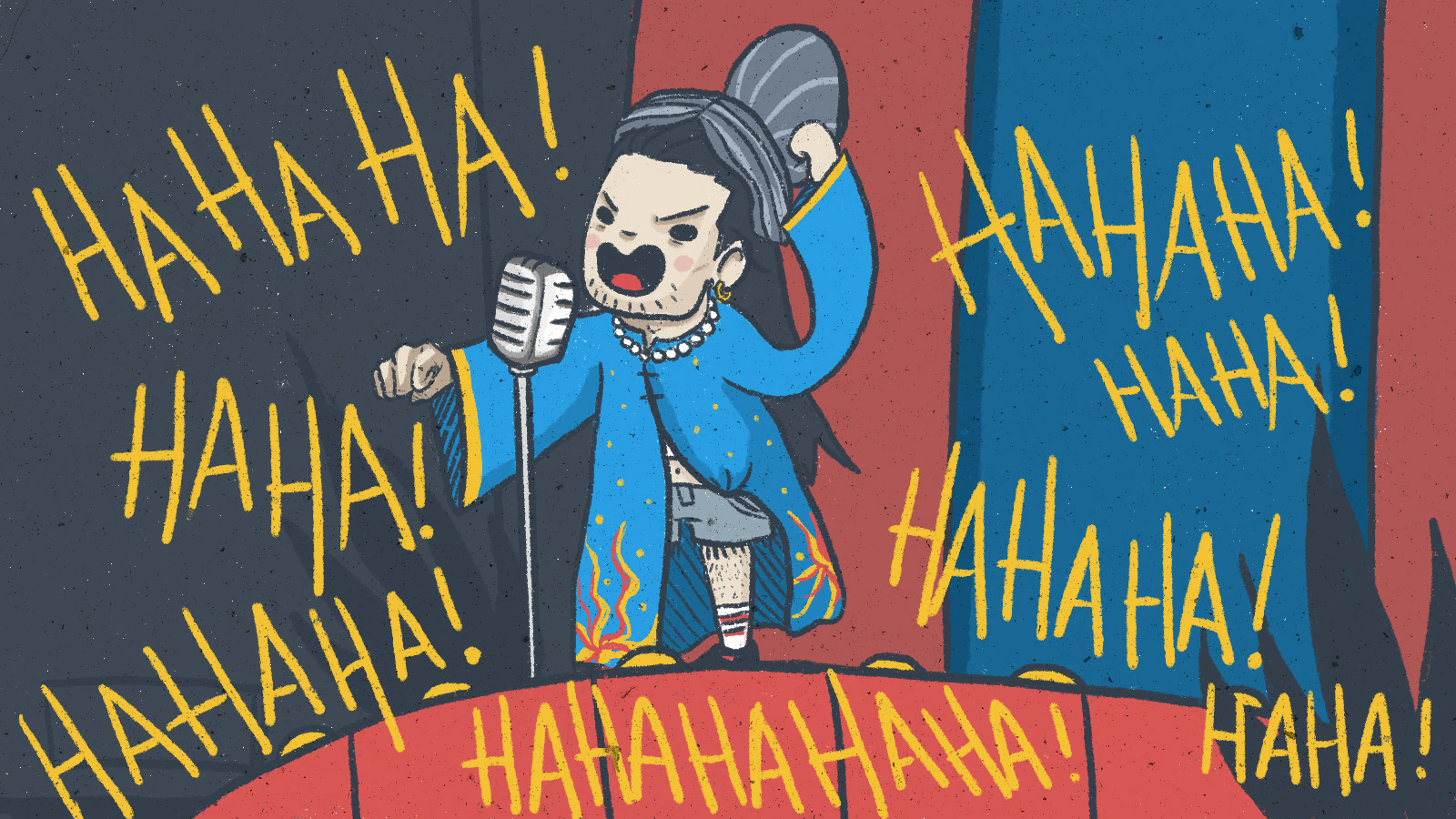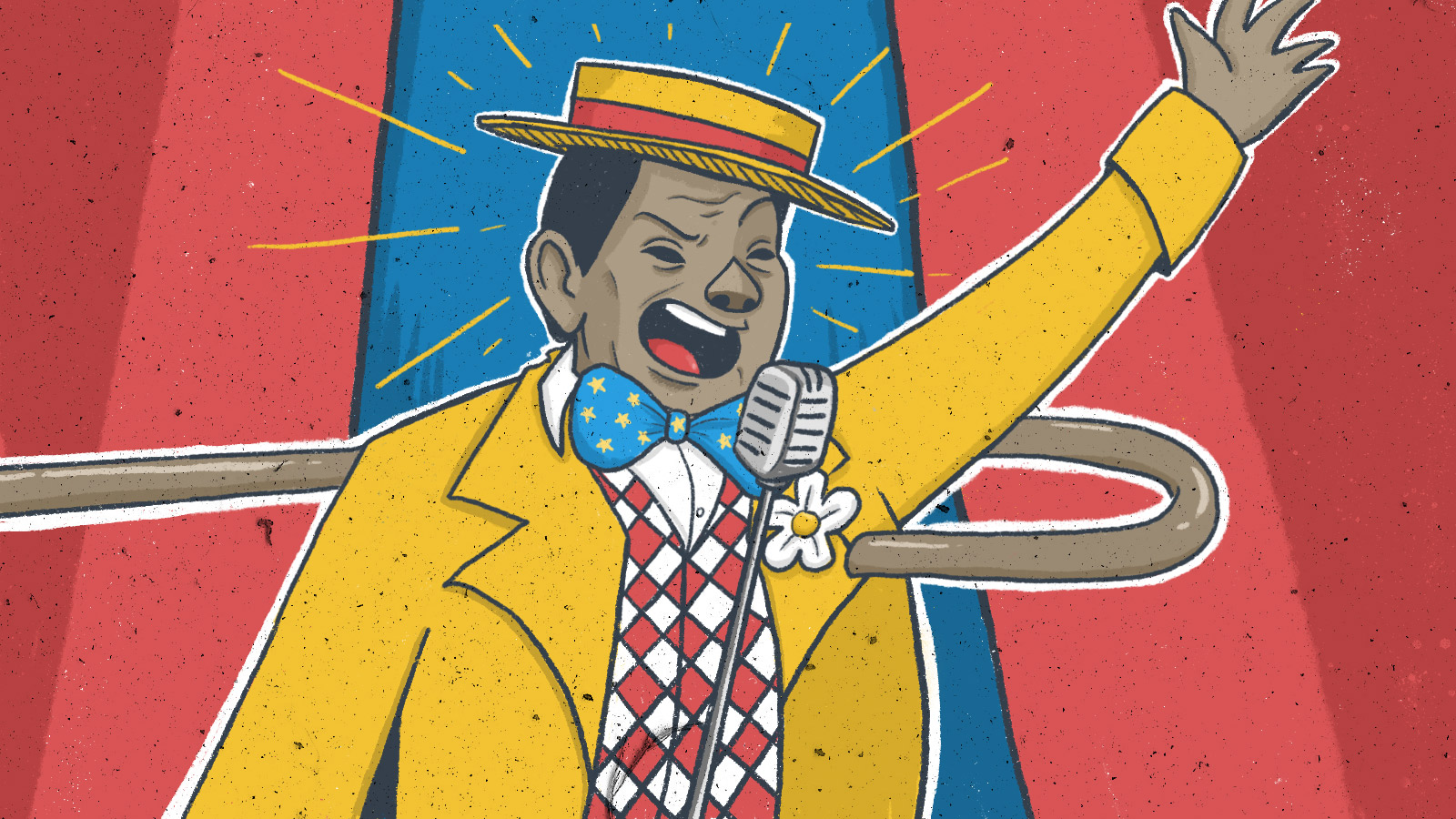It wasn’t much of a joke. More of a quip. But it had the desired effect, as it usually does when Rodrigo Duterte cracks wise amid the adoring throngs at his campaign rallies.
He would sacrifice his life for the Filipino people, he said. Even accept execution by hanging with a smile. As long, of course, as he could stare at a beautiful woman as he died.
The crowd of 30,000 at the Bulacan rally laughed along as Duterte hit the morbid, somewhat groan-inducing punchline.
The February event at the local sports center in San Jose Del Monte marked the campaign kickoff for Duterte’s Partido Demokratiko Pilipino-Lakas ng Bayan party (PDP-Laban), a heavy favorite in Monday’s midterm polls that will elect 12 national senators and a slew of local officials.
Duterte’s often coarse brand of comedy is by now a familiar part of his stump speeches. Amid the cursing and tirades, he’ll innocently tease his own party’s senatorial candidates about their appearances and love lives before then blasting opponents with a more blistering brand of one-liner.
From presidents to town councilors, politics is rarely without humor – or at least attempts at it – in the Philippines.
That’s been the case for decades, but today, candidates are just a bit more brazen with their jokes and critics just a bit more public with their lampooning now that a man who insists he be taken seriously — but not literally — is president.

A fiesta democracy
Political analyst Richard Heydarian calls the Philippines a “fiesta democracy.”
Anyone who has been here during election season would probably agree. Campaign posters hang like colorful streamers from lampposts, free food and gifts are a fixture on street corners, and candidates’ jingles can be heard round the clock.
But the party atmosphere is most obvious at the rallies, which bear more than a passing resemblance to the television variety shows that remain hugely popular here.
Rather than sharing concerted plans of action, candidates are far more likely to deliver punchline-laden speeches before eventually breaking into song or dance.
“I think it’s an extension of our overall culture, whereby we try to cope with stress and disappointments through humor, through festivity,” Heydarian told Coconuts Manila recently.
For Heydarian, who has taught political science at top local institutions the Ateneo de Manila University and De La Salle University, and is a regular on GMA News, Al Jazeera, and BBC, the fiesta culture can be both good and bad.
“Good in a sense that we have made the electoral practice a major part of our culture,” he said.
The Philippines’ last two midterm elections both had an average voter turnout of above 70 percent. But while Filipinos are exercising their right to vote in greater numbers, the bad side of the so-called fiesta democracy seems to outweigh the good.
“The fiesta side of the culture also makes it very hard for us to have substantive, in-depth discussions, and also to have, I think, a painful confrontation with the dark side of our political system,” Heydarian said.
He pointed out how few prominent candidates even bother to participate in debates anymore.
Candidates of the Duterte-supported Hugpong ng Pagbabago (HNP) alliance have been criticized for routinely declining to take part in debates.
While she took part in one herself, HNP senatorial bet Imee Marcos (daughter of the former dictator) admitted in February that she prefers visiting towns across the country over participating in debates she described as time-consuming. This parrots the argument of Duterte, who once called debates “stupid” and “ridiculous.”
During his own debate appearances ahead of the 2016 presidential elections, Duterte mostly used the podium for typically showy and hyperbolic declarations. In one, he said he would ride a jet ski to the South China Sea to plant the Philippine flag and assert the country’s claim on the disputed area.
“I would say ‘This is ours and do what you want with me,’ it’s up to you. I would state that claim and if they want to, you know … I’ve long dreamed of becoming a hero,” he said in English and Filipino of the possibility of being killed.
This got him laughs and cheers from the audience, most, but not all, of whom seemed to understand it was comic hyperbole.
“It’s just talk,” he later had to explain for the benefit of his more credulous followers.
“I’m surprised you believed it.”
Less sense, more impact
“If you look at the debates, all three debates, the Duterte style essentially was again that of the ‘joker,’” Heydarian said.
“He had the worst delivery of the arguments in the conventional sense. He hardly made sense in a substantive way, but he had [an] audience impact.”
That style has continued through his presidential term, with his camp always at the ready to explain, defend, or walk back a seemingly never-ending stream of controversial “jokes.”
READ MORE: DICK MOVE: Duterte brags about penis in public speech
“If the audience is laughing, you are joking,” was the best presidential spokesman Salvador Panelo could offer after Duterte, whose notorious war on drugs has claimed an estimated 27,000 lives, said he personally used marijuana to stay awake.
Given Duterte’s very public support of medical marijuana legalization, you could be forgiven for thinking there was at least a chance he was serious.
But like Panelo, the president puts the onus on the audience to keep up with his japery. If a statement is too ridiculous, he said, amid a mild furor over the marijuana wisecrack, then “it must be a joke.”
None of it, of course, has dented Duterte’s still-high popularity ratings. Only in the past month, he earned a “very good” net satisfaction rating, in a poll conducted by Social Weather Stations.
With that sort of public acceptance, it’s no wonder that heading into this year’s elections, many are taking a page out of the president’s playbook and trying on their own comedy stylings for size.

Vote for me, I’m funny
Ronald “Bato” de la Rosa wasted no time in making the audience laugh when he took the stage at HNP’s kick-off campaign rally in February.
“I’ll go straight to singing, is that OK with you?” he shouted at a crowd in San Fernando, Pampanga, before then immediately segueing into a risqué joke.
“They say the quickest way to learn the Kapampangan language is to always ‘lips to lips’ with someone from Pampanga, so that the transfer of knowledge is faster,” he said to big laughs that only seemed to fuel him.
In another campaign rally in March, the burly former Philippine National Police chief joked he would have those not clapping for him executed by the police, just like they do in the real-life anti-drug operations he launched in 2016.
Among the current senatorial candidates, de la Rosa is one of the most successful in emulating Duterte’s stump speech style, according to Heydarian, the political analyst.
“You have so many Duterte wannabes today,” he said.
“You have a lot of mini-me Dutertes, or wannabe Dutertes, or people who are getting certain elements of Duterte and trying to incorporate it into their game. And a lot of them, they flop, because it doesn’t come off as authentic, it comes off as [being a] copycat,” he said, adding that de la Rosa has come to be seen as something of a Duterte sidekick.
That’s nothing that bothers de la Rosa, who sees nothing wrong with his policy-light, entertainment-heavy style of campaigning.
“Let’s be frank. Those people, would they purposely go just to listen to issues? I don’t think so. Those people go there to be happy. If you make people there laugh, they’d be more at ease with you,” he said on CNN Philippines’ The Source in March.
And multiple surveys suggest it’s an effective strategy.
A first-time candidate with no prior experience in lawmaking, de la Rosa is currently to finish no lower than ninth, according to a survey released by Pulse Asia last month.
His fellow HNP candidates Marcos and formerly jailed ex-Senator Jinggoy Estrada — who also took a joke-heavy approach at the February rally — are now both polling among the 14 candidates considered to have a statistical shot at winning. Of those, 10 are supported by Duterte.
In contrast, the opposition Liberal Party (LP), which has positioned itself as the serious, no-nonsense option, has just one candidate — incumbent Senator Benigno “Bam” Aquino IV — currently ranked in the top 14.
“It seems it’s all about entertainment, and about name recall, and about having a good time,” Heydarian said.
But while humor is being widely used by candidates to appeal to voters, it’s also long been a key tool of those hoping to hold politicians to account.

A nation of satirists
“If I were to take a [political] side, I would take the side of the Pinoy,” comedian Jon Santos said at the end of his show Trumperte (Trump-Duterte) in March.
Wearing black from head to toe, it was the first time he was speaking as himself after having spent the past hour or so impersonating political figures at San Juan City’s Music Museum.
Santos, a political impersonator for 30 years, is at his busiest every three years during national election season, the moment when he and his fellow comedians are presented with a wide array of powerful targets to lampoon.
“There’s this saying that we kinda think applies to us, that comedians are the barometer of social tension,” he told Coconuts.
For Santos, humor serves as a release valve for people who otherwise might feel powerless in the face of the country’s problems.
“Even just for an hour and a half, the Pinoy wins over traffic and over prices, and over corruption,” he said.
“We are going to laugh and we are going to recover and tomorrow, we take a deep breath. We go to the bathroom, wash our face, take a bath, and fight again, and live life again, and cope again.”
Comics like Santos come from a long tradition, with Filipinos having used forms of comedy to speak out against the government since the Spanish colonial period. Revolutionary hero Jose Rizal famously lampooned the church and government officials in his novel Noli Me Tangere (Touch Me Not).
“This country has been founded by satirists and people who lampoon authority,” journalist Lourd de Veyra, who hosts documentary shows about history and pop-culture for network TV5, told Coconuts. “You can say that one of the things that gave lifeblood to us as an early nation was the satirists. That is embedded in our DNA as a country.”
In the past, satire was found in books, editorial cartoons, and, in Santos’ case, the stage and television. Today, there are memes — and lots of them.
Filipino netizens are experts at turning political issues and faux pas into viral posts. When Congressman Pantaleon Alvarez was ousted and replaced by former president and current Congresswoman Gloria Macapagal Arroyo as speaker of the house in July last year, Twitter was filled with memes inspired by Game of Thrones and House of Cards within seconds.
Posts are even harsher during elections, like this guy who uploaded a selfie with Senatorial candidate Ramon “Bong” Revilla Jr. — who has been accused of stealing taxpayers’ money — with the caption: “Don’t worry. I didn’t lose anything. I held on to my wallet tightly.”
But satire can only do so much, and when politicians and aspiring government officials go out of their way to make fun of themselves, it can become less effective.
“I think humor is a double-edged sword,” Heydarian said, explaining that humor can undermine the confidence of a politician like US President Donald Trump, who is deeply sensitive to negative comments and wants to be taken seriously, but probably not someone like Duterte.
“It could actually backfire if we have someone like Duterte who makes fun of himself already … he can actually co-opt the satire.”
But that didn’t stop Santos from trying. While his impersonation of the president at the March show earned some big laughs, by the end, it had become oddly moving.
In the segment, Duterte is struck by lightning, loses consciousness, and wakes up a totally new man — God-fearing, unable to curse, unaware of the people he has killed.
Turning to his security guard, Santos’ Duterte asks a question that will ultimately be up to the Philippine people to decide — if via his political proxies — on Monday.
“Am I that bad?”



